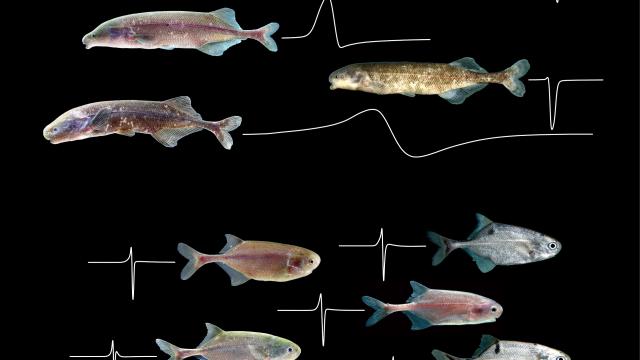A scientist who studies the small, silver elephantfish may have stumbled on the key to speciation, the process that allows one species to evolve into two or more. And it’s all about developing new sensory perceptions.
The elephantfish, like a few other creatures who live in cloudy water, communicates via weak electrical signals. Using a special organ that sends and receives the signals, the fish are able to navigate and find each other even when there is zero visibility. Washington University biologist Bruce Carlson has studied roughly 200 species of these fish for many years, and wanted to find out if there was any connection between the structure of the fishes’ brains and their rapid speciation. What he found was that brain complexity seemed to cause fish to evolve and diversify quickly. And the brain complexity came directly from the fishes’ sensory processing power.
According to a release about the study:
Living in clouded, muddy environments requires the fish to recognise the electrical signals of their own species and ignore signals from other species. With that in mind, the researchers looked at a region of the midbrain that is devoted to analysing such signals, known as the exterolateral nucleus or EL, in 26 different species of elephant fishes. They found that EL development led to improved signal detection and rapid speciation in one lineage of Mormyrids, while a sister lineage that diverged prior to EL development had reduced signal detection abilities and has not diversified.
The fish that were better able to recognise different kinds of electrical discharges and pulses, as well as the timing of pulses, had far more complex sensory systems than the ones that didn’t.
At left, you can see an illustration of the different species. Carlson and his colleagues write today in Science:
In the top group of fishes, species in the genus Paramoryrops that has the complex signal-processing brain, discharges have changed quickly, resulting in dramatically different pulses among closely related species. In the bottom group of fishes, species in the genus Petrocephalus whose midbrain is more simply structured, all of the species have similar pulses. The difference arises because the top group has the anatomical features needed to exploit the signal space — such as the anatomy needed to make different pulses and the sensory and analytical ability to perceive small differences in pulse shape.
Said Carlson:
It’s always difficult with evolutionary studies to say that any one trait is the cause or the trigger for another. But in this case we were able to show that the complex signal-processing brain evolved before a burst of speciation, that signal variation was higher among fishes with that brain, and that these fishes could distinguish among subtly different pulses, whereas others could not. Together it adds up to a strong case for brain evolution triggering increased diversification.
What Carlson’s work suggests is that species whose brains are evolving fairly rapidly – hello, Homo sapiens – are likely candidates for speciation under the right circumstances. The key with the elephantfish seemed to be rapid evolution in the brain’s ability to sort out sensory inputs.
Does that mean that as humans deal with more sensory bombardment from our mediascape that we’ll start evolving into multiple species? Perhaps humans who live in low-sensory bombardment areas in rural regions will remain Homo sapiens while the rest of us become weird new creatures who are able to navigate narrow streets covered in augmented reality overlays? Let the rank speculation begin.
Read the full scientific paper via Science.
Illustration by imredesiuk/Shutterstock
